Key takeaways:
- Identifying venue needs is crucial for event success, considering factors like capacity, accessibility, and essential amenities.
- Different venue types impact the event’s atmosphere; options range from banquet halls to art galleries.
- Accessibility and location are key to ensuring guest comfort and convenience, affecting attendance and overall enjoyment.
- Budgeting for venues involves understanding costs, hidden fees, and prioritizing essential features that align with your vision.

Identifying your venue needs
Identifying your venue needs is an essential step that can truly shape the success of your event. I remember when I was planning my sister’s wedding; I had to think about the number of guests, the type of atmosphere we wanted, and even the accessibility for everyone involved. Have you considered how the venue’s layout might impact the flow of your event?
As I dug deeper into what we required, I discovered that specific features mattered more than I anticipated. For instance, the catering facilities were crucial for a seamless dining experience, and I learned the hard way that not all venues had adequate kitchen access. What are the must-have amenities that you can’t compromise on?
I also found that the venue’s location played a significant role in attendance. When I chose a central spot, it made it so much easier for everyone to join in. Have you thought about how your location could affect who shows up and how they feel about your event? This exploration of your venue needs ensures you’re not just choosing a space but creating the right experience.
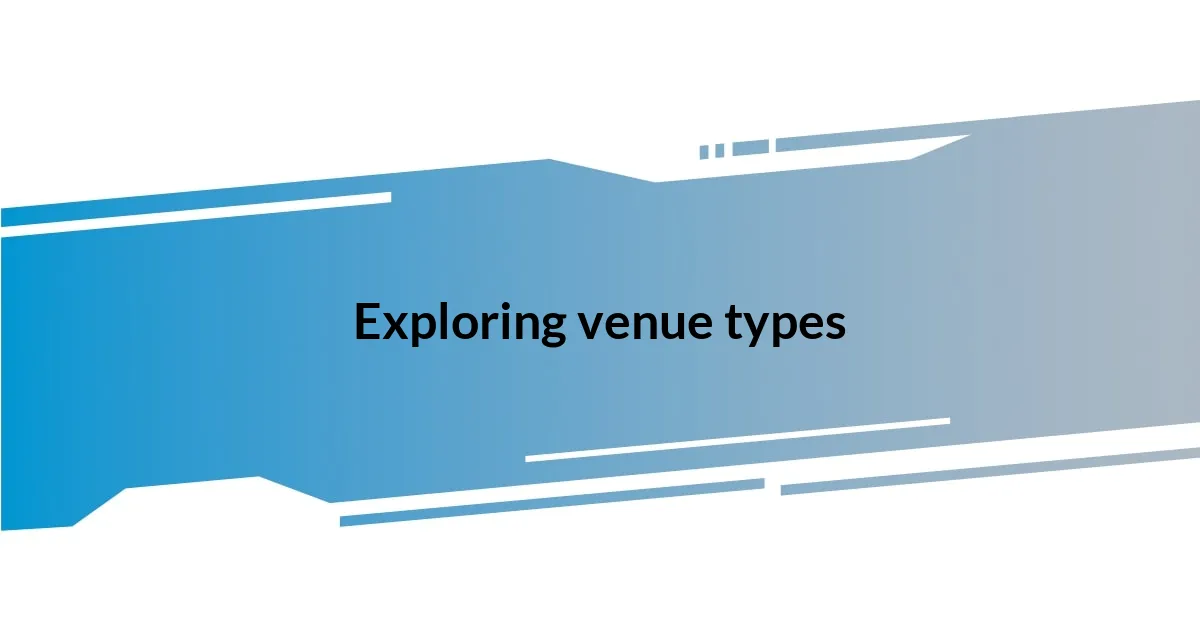
Exploring venue types
When diving into the world of venue types, I found it fascinating how different environments could transform the feel of an event. For my sister’s wedding, we considered everything from intimate garden settings to grand ballrooms. Each option evoked a different mood; an outdoor venue under twinkling lights felt romantic, while a rustic barn conveyed warmth and charm. I realized that my choice reflected not just my preferences but the couple’s unique story.
Here are some common venue types to explore:
- Banquet Halls: Spacious and versatile, often equipped with catering options but can feel impersonal.
- Outdoor Gardens: Perfect for romantic or casual events, but weather can be a risk.
- Cultural Halls: Offer unique cultural themes and settings that can add personal significance.
- Hotels: Convenient for accommodations, yet may lack the character of a standalone venue.
- Art Galleries: Infuse creativity and elegance, though might require special arrangements for catering.
I distinctly recall visiting an art gallery—a space filled with vibrant paintings sparked ideas that defined the event’s theme. It was enlightening to witness how the venue itself could inspire creativity and engagement among guests.
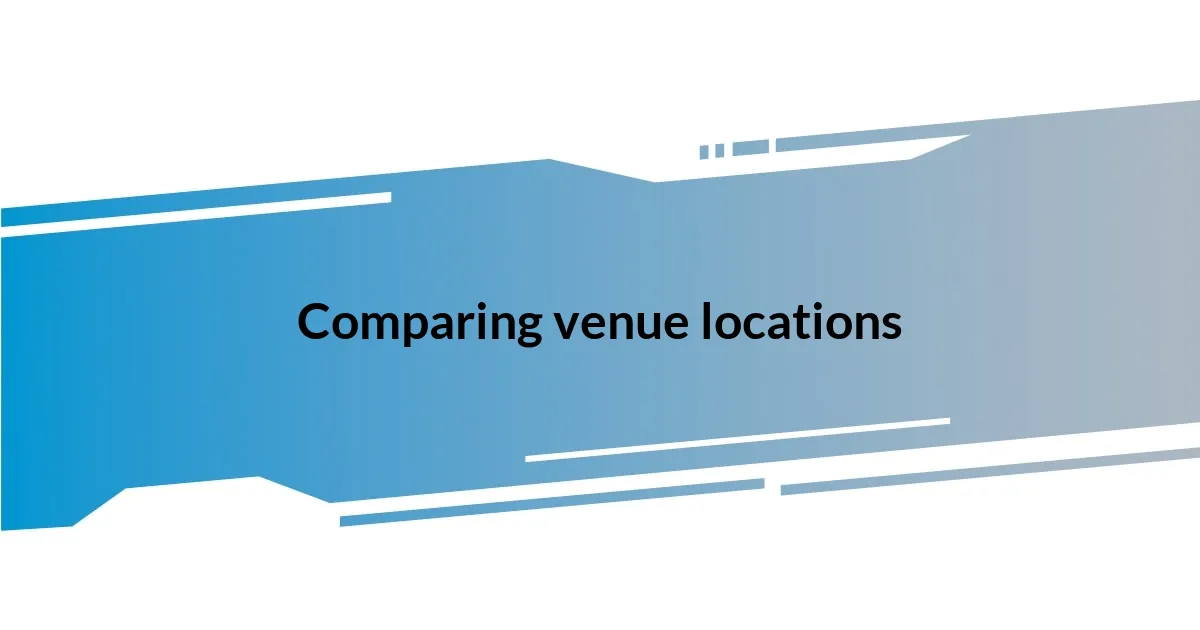
Comparing venue locations
When comparing venue locations, I learned that accessibility is paramount. I vividly remember one venue that seemed ideal until I realized it was a challenge for elderly relatives to access. This made me rethink my priorities. Have you ever considered how the location impacts not just guests’ ability to arrive, but also their overall comfort and enjoyment?
Another critical factor is proximity to accommodations and transportation. While scouting venues, I found a charming spot, but it was miles away from hotels and major transport hubs. This limitation became apparent when I envisioned guests struggling to find their way back after the celebration. How important is it to you that your venue is within reach of essential services?
Lastly, I discovered that the surrounding environment affects the vibe of the event. I chose a location near a beautiful waterfront, which added a level of serenity and beauty that I didn’t expect. The unobstructed views became an integral part of our event’s appeal. Have you thought about how the location’s scenery can elevate your gathering?
| Venue Aspect | Considerations |
|---|---|
| Accessibility | Ensure easy access for all, particularly for people with mobility challenges. |
| Proximity | Be close to hotels and transport for convenience and comfort. |
| Environment | Consider views and surroundings that can enhance your event’s atmosphere. |
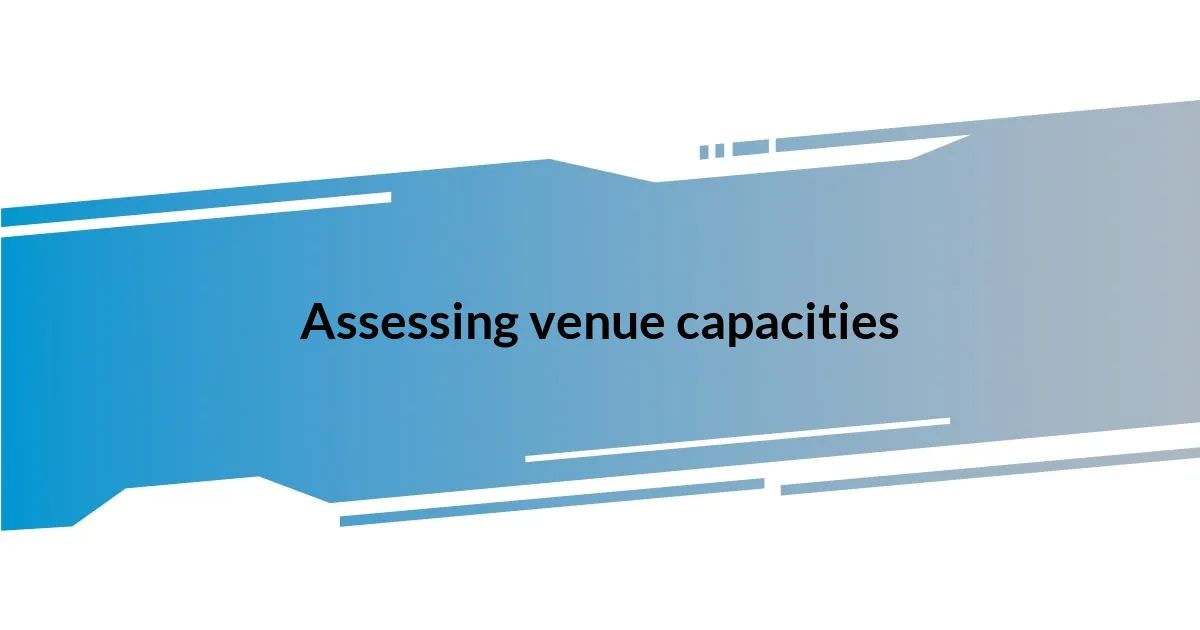
Assessing venue capacities
When I started assessing venue capacities, numbers became a focal point of my decision-making. It’s crucial to have a clear idea of how many guests you plan to invite and the venue’s limitations. I remember feeling a twinge of anxiety when one venue I loved had a capacity barely enough for half of our list. It made me question if sacrificing that dreamy space was worth the guest experience.
In my experience, I found it helpful to visualize the space in relation to my event’s atmosphere. For instance, a venue can feel empty and lackluster if it’s too big for the guest list. Conversely, if it’s too small, it can become cramped and uncomfortable, dampening the joyous spirit of the occasion. One particular place struck me with its intimate feel; it could fit a crowd just perfectly, allowing for mingling without feeling suffocating. Have you ever thought about how your venue size might influence not only the vibe but also the comfort of your guests?
Ultimately, I learned that flexibility plays a role in venue selection, too. Some spaces can be rearranged to suit varying capacities, which is a significant plus. As I navigated this part of the planning, knowing that a venue could accommodate fluctuating numbers became comforting. I empathized with my sister’s desire for a space that felt alive yet intimate; finding that balance added to the excitement of the planning process. How do you envision creating a memorable atmosphere with your chosen venue?
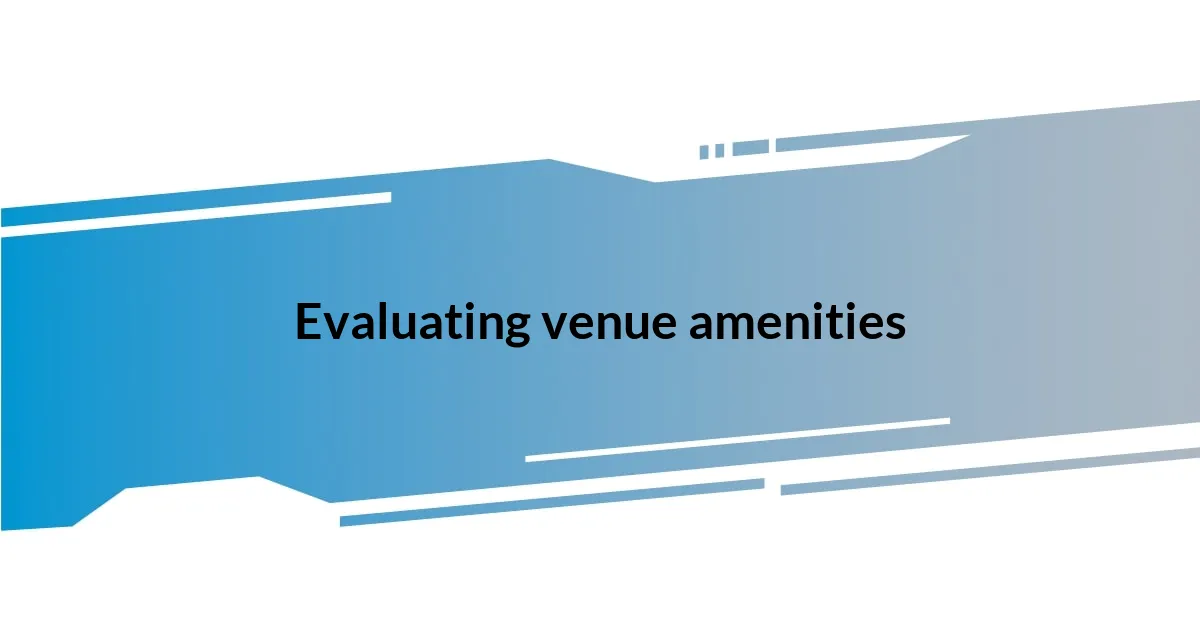
Evaluating venue amenities
Evaluating venue amenities is where I started to feel that the choice of venue goes beyond just its aesthetic appeal. I distinctly remember falling in love with a beautiful venue, but then I stumbled upon the catering options—or lack thereof. They offered only one catering company, and after tasting the sample menu, I knew it wouldn’t satisfy my guests’ diverse palates. How do you plan to accommodate different tastes and dietary restrictions when choosing a venue?
I also realized that crucial amenities like Wi-Fi access, sound systems, and lighting options can make or break an event. When I attended a friend’s wedding at a venue with inadequate sound, it left a lasting impression. Guests struggled to hear the vows, and that moment felt diminished. Have you thought about how logistical details can impact the overall experience for you and your guests?
In my journey of evaluating venue amenities, I’ve learned the importance of visualizing how these features contribute to the event’s flow. For instance, one venue boasted a beautiful garden area for cocktail hour, but without enough seating, it made mingling feel chaotic instead of relaxed. I can still picture the cramped space filled with guests trying to balance their plates. It makes me wonder: how will you ensure that every aspect of your venue enhances the joyful atmosphere you’re aiming for?
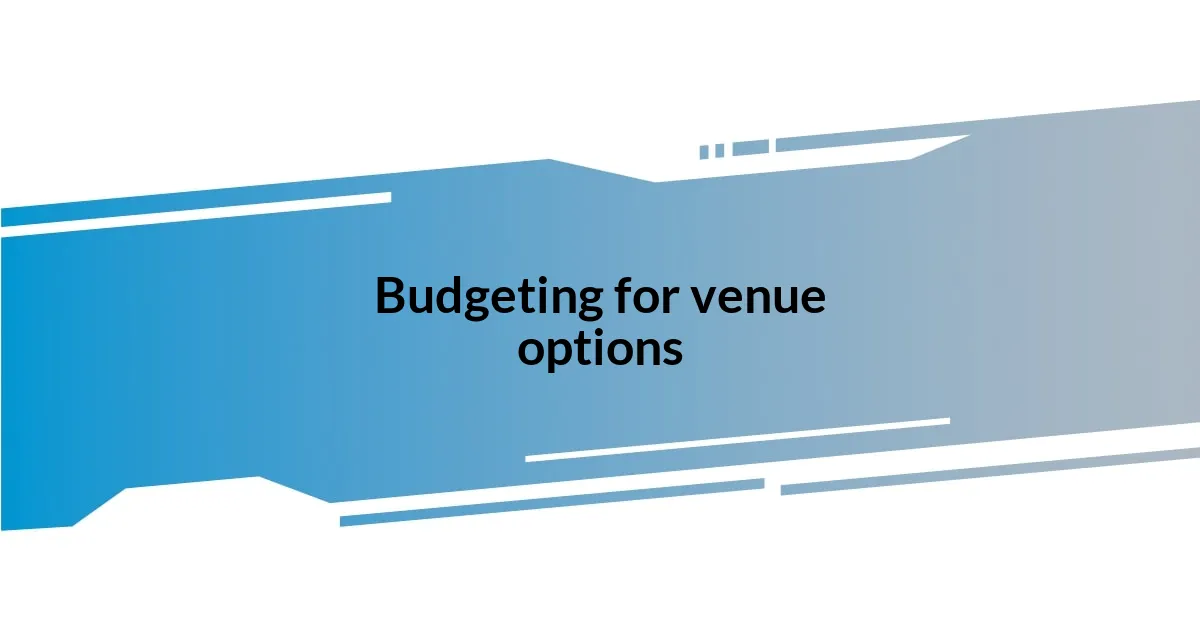
Budgeting for venue options
When I started to dig into budgeting for venue options, I discovered that costs can vary widely based on location and amenities. I remember sitting down with a spreadsheet, trying to crunch the numbers while my enthusiasm slowly turned into concern. It was surprising to see how much just the venue could eat into our overall budget. I began to wonder, how can I find a space that checks all the boxes without breaking the bank?
I found it helpful to prioritize what was essential to us and what we could potentially cut back on. For example, we decided that a beautiful outdoor setting would be a non-negotiable but realized we could save on decor if the venue already had a stunning backdrop. It’s fascinating how some venues come with services included, like tables and chairs, which can save you quite a bit. Have you considered how much value these extras could add to your planning process?
As I weighed the options, I also learned about hidden costs that could sneak up on you. For instance, some places charged steep fees for things like security or cleaning, which wasn’t apparent at first glance. It was a bit of a reality check when I realized my dream venue could quickly become a financial nightmare. I often ask myself: how can you be both practical and dream about your ideal venue at the same time? It’s about balance—enjoying the journey while staying grounded in reality.

Making the final decision
As I approached the final decision, it felt almost palpable—the pressure was mounting. I recall sitting in my living room with venue brochures spread out like a colorful map of possibilities. I found myself asking, “Which place truly resonates with the vibe I want for this event?” It’s a question that tugged at my heartstrings as much as it did my pragmatic side.
Choosing a venue is not just about practicality; it’s about creating an atmosphere that reflects your vision. I vividly remember standing in one venue and envisioning my friends and family laughing, dancing, and celebrating. However, another venue had that intangible charm that made me feel at home. In those moments, I realized I was not just selecting a space; I was laying the groundwork for cherished memories. Have you taken time to envision what memories you want to create in that venue?
With a narrowed-down shortlist, the ultimate decision had to be made, and the emotional weight was heavy. I reached out to friends and family for their honest opinions, knowing this choice would affect everyone. Confiding in my loved ones revealed deeper insights—they often saw aspects I overlooked in the whirlwind of my excitement. I found myself thinking: who better to help visualize my dream than those who will be a part of it? It truly highlighted the importance of collaboration in making a final decision.